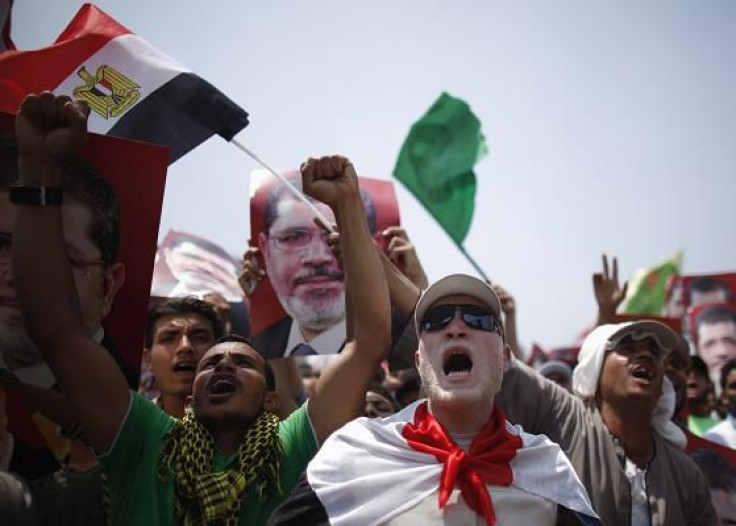Egypt At Crossroads As Army’s Deadline Looms

Hours ahead of a self-imposed 16:30 deadline, the Egyptian military and Islamist president Mohammed Morsi are seeking to avert a political crisis in a country that has already witnessed massive demonstrations calling for the removal of Morsi. But Morsi, emboldened by members of his Muslim Brotherhood party, has rejected such overtures, citing that he is the “legitimate” leader of Egypt and will not step down.
It is unclear if the army’s deadline marks the point at which the armed forces will declare martial law or simply formally enter into direct negotiations with Morsi. Protesters have complained that Morsi is pushing Islamism onto the country, while the Brotherhood has accused its enemies (including the army) of plotting a coup. Protesters have also complained that Morsi has failed to improve a battered economy.
In a defiant speech on Tuesday evening, Morsi blamed the latest waves of dissent on remnants of the former regime of ousted President Hosni Mubarak. "My life is the price for protecting the legitimacy," Morsi said in the televised speech . "If my blood was the price to maintain legitimacy, then I am ready for this for the sake of this nation's stability."
The chief of Egypt's armed forces, Abdel Fattah al-Sisi, was similarly defiant. "We swear to God that we will sacrifice our blood for Egypt and its people against all terrorists, extremists and ignorant [groups],” said a statement posted on the military’s Facebook page. "It [is] more honorable for us to die than to have the people of Egypt terrorized or threatened."
Indeed, in the middle of this imbroglio is the army, which has vowed to impose order and resolve the crisis, by reportedly calling for new presidential elections, suspending the draft constitution and suspending parliament. In the interim, they would form a temporary government led by a senior army commander. Senior opposition leader Mohammed ElBaradei has also urged the military to intervene to stop further bloodshed, Reuters reported.
Overnight, at least 16 people were killed and 200 injured in clashes pitting pro- and anti-Morsi supporters in Cairo and Alexandria. But Morsi’s position is weakening as the clock ticks – on Monday, six of his ministers, including Foreign Minister Kamel Amur, resigned. It is also unclear if Morsi would even agree to talk directly with the army. Al Jazeera reported that the parties supporting Morsi have already rejected an invitation to meet with senior army officers just hours before the deadline. "We do not go to invitations [meetings] with anyone. We have a president and that is it," said Waleed al-Haddad, a senior leader of the Islamist Freedom and Justice Party, told Reuters.
Al Jazeera's Sherine Tadros summed up the mood in the country. "Egyptians across the country and even Egyptians outside the country watching from afar are incredibly worried about the situation in their country," she said from Tahrir Square in Cairo. "This is probably the most critical point in Egypt since former President Hosni Mubarak was ousted in February 2011."
© Copyright IBTimes 2024. All rights reserved.











